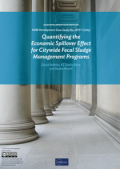
This report introduces a model describing the full financial realities of fecal sludge management (FSM) projects; a methodology for quantifying the costs, direct effects, and economic spillover effects; and a toolkit to calculate their net present values and the overall program’s internal rates of return. This is demonstrated in the report through two citywide FSM programs in the Philippines. In both programs, economic spillover effects include improved tax revenues, property values, and health outcomes, and the present values of the direct effects and economic spillover effects exceed the original capital expenditure. This implies that when the policy makers set user charges to cover the recurrent costs such as operation and periodic maintenance, the FSM programs would be sustainable.

Enabling the Business of Agriculture 2019 presents indicators that measure the laws, regulations and bureaucratic processes that affect farmers in 101 countries. The study covers eight thematic areas: supplying seed, registering fertiliser, securing water, registering machinery, sustaining livestock, protecting plant health, trading food and accessing finance. The report highlights global best performers and countries that made the most significant regulatory improvements in support of farmers.
Food companies are not only at risk due to water scarcity, they are also responsible for it. Agriculture is rapidly draining aquifers in many regions of the world, and meat production is one of the biggest polluters of watersheds globally. This report provides investors with guidance and relevant data for evaluating the water risk management of 40 major companies in the agricultural products, beverage, meat, and packaged food industries. It also tracks their progress in managing their water risks as compared to performance in 2017 and 2015. This analysis can help food companies manage their water risks more effectively, which is critically important to their bottom lines.
This paper discusses the need to encourage the development and adoption of processes and methods that can quantify the costs of using natural resources.
In a new report, 'Nature is too big to fail – Biodiversity: the next frontier in financial risk management', PwC Switzerland and WWF Switzerland find that the financial risks associated with the loss of biodiversity will become increasingly important in 2020 - especially in the lead up to the United Nations Biodiversity Conference in October in Kunming (China).
As climate change and the loss of biodiversity mutually reinforce each other, decision-makers face a huge challenge to respond to this double crisis, as the risk of financial market instability significantly increases.
